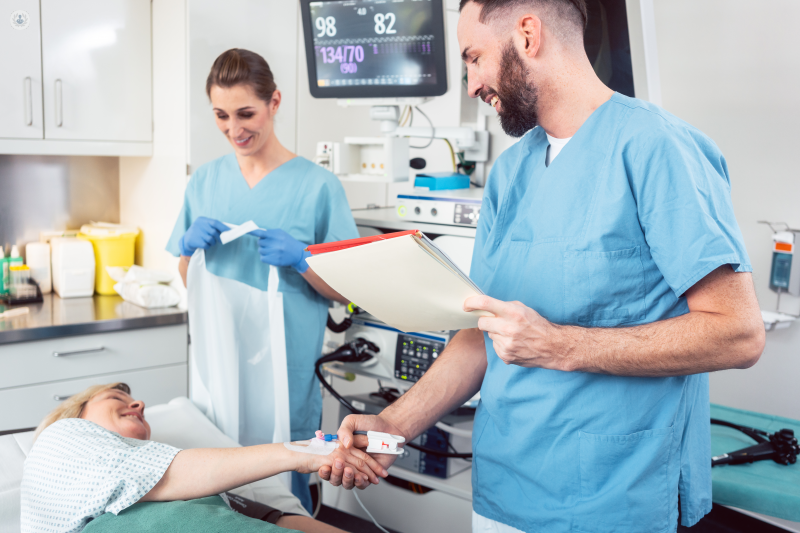How do I prepare for a colonoscopy?
Escrito por:A colonoscopy is a procedure to examine the rectum and colon (large bowel) with a flexible video telescope. The telescope enters the anus into the large bowel and allows the endoscopist to obtain a clear view of the lining of the bowel. This allows the endoscopist to make a new diagnosis or check on an existing condition.

During a colonoscopy, biopsies can be taken or polyps removed if any are found. Biopsies can aid in establishing a diagnosis and polyps can sometimes become cancerous, so if found during the procedure, are best removed. There are some specific therapeutic procedures done by colonoscopy such as laser treatment of bleeding or balloon dilation of a narrowing, but these will be planned on an individual patient basis.
One of London’s leading consultant colorectal surgeons Mr Nicholas Reay-Jones guides us through a colonoscopy and what we can expect.
When is a colonoscopy recommended?
A colonoscopy is recommended for a number of reasons:
- Investigation of bowel symptoms such as bleeding, a change in bowel habits or abdominal pain
- Strong family history of bowel cancer
- Assessment of chronic conditions such as ulcerative colitis or Crohn`s disease
- Specific therapy for a pre-existing condition
Preparing for a colonoscopy
Preparation for the procedure involves following a diet and then taking a strong laxative the day before the examination to clear the large bowel. This facilitates good views of the bowel lining to assess for any abnormalities. The procedure is done as a day case. Usually, patients will have either a sedative injection or Entonox gas to relieve any discomfort during the procedure (a general anaesthetic is not usually indicated). Some discomfort is experienced but the medication usually makes the procedure comfortable and tolerable for the majority of patients.
In a small number of patients, either due to discomfort, poor bowel preparation or due to an abnormality of the bowel, the procedure will not be completed. In this situation, alternative methods to assess the bowel will be required.
The risks involved
The risks of the procedure are small. Bleeding is possible, especially if biopsies are taken or polyps are removed. If bleeding occurs, it is usually only transient for about 24 hours. The major possible complication is bowel perforation, but this is rare. Rarely do patients suffer a reaction to the sedative drugs taken for the procedure.
What to expect after a colonoscopy
After the procedure is done the findings are discussed on the day and if biopsy results are awaited then a follow-up consultation will be arranged to discuss these. If further tests for any condition diagnosed on the colonoscopy are required these will be arranged as necessary.
On discharge after the procedure, patients can eat and drink normally and should feel well. If an intravenous sedative has been given then patients cannot drive for 24 hours and should have the following day off work. If just Entonox gas is used then these restrictions do not apply.
If you would like to inquire about a colonoscopy in the London area, visit Mr Nicholas Reay-Jones Top Doctors profile in the link attached.



